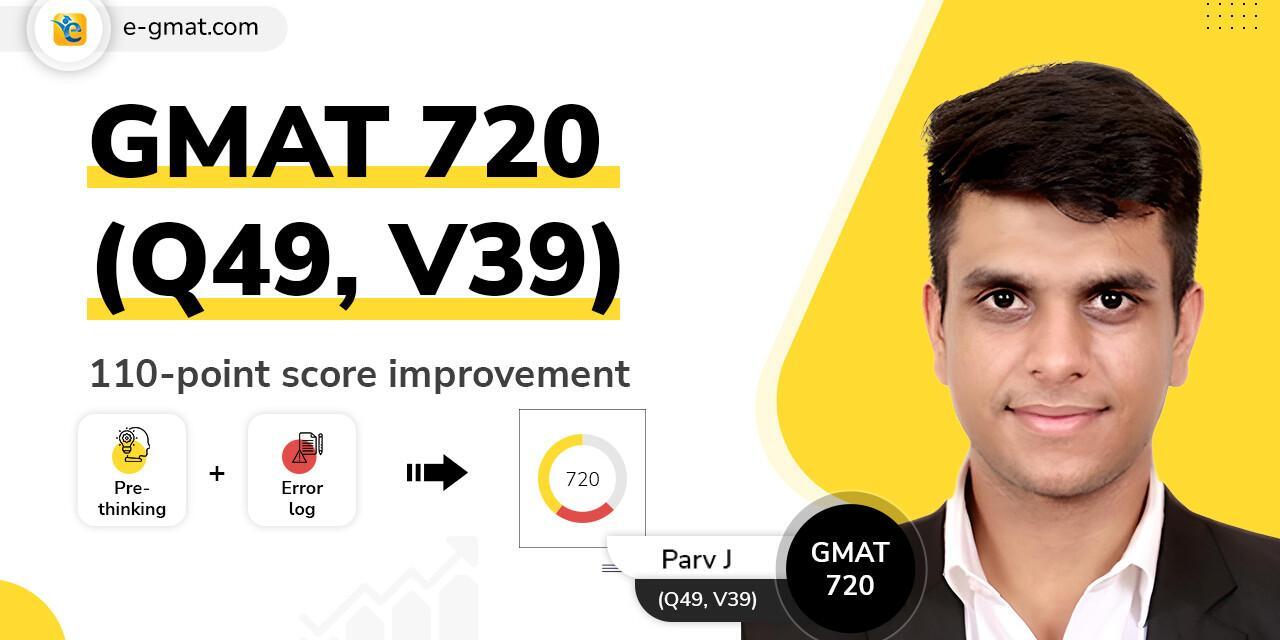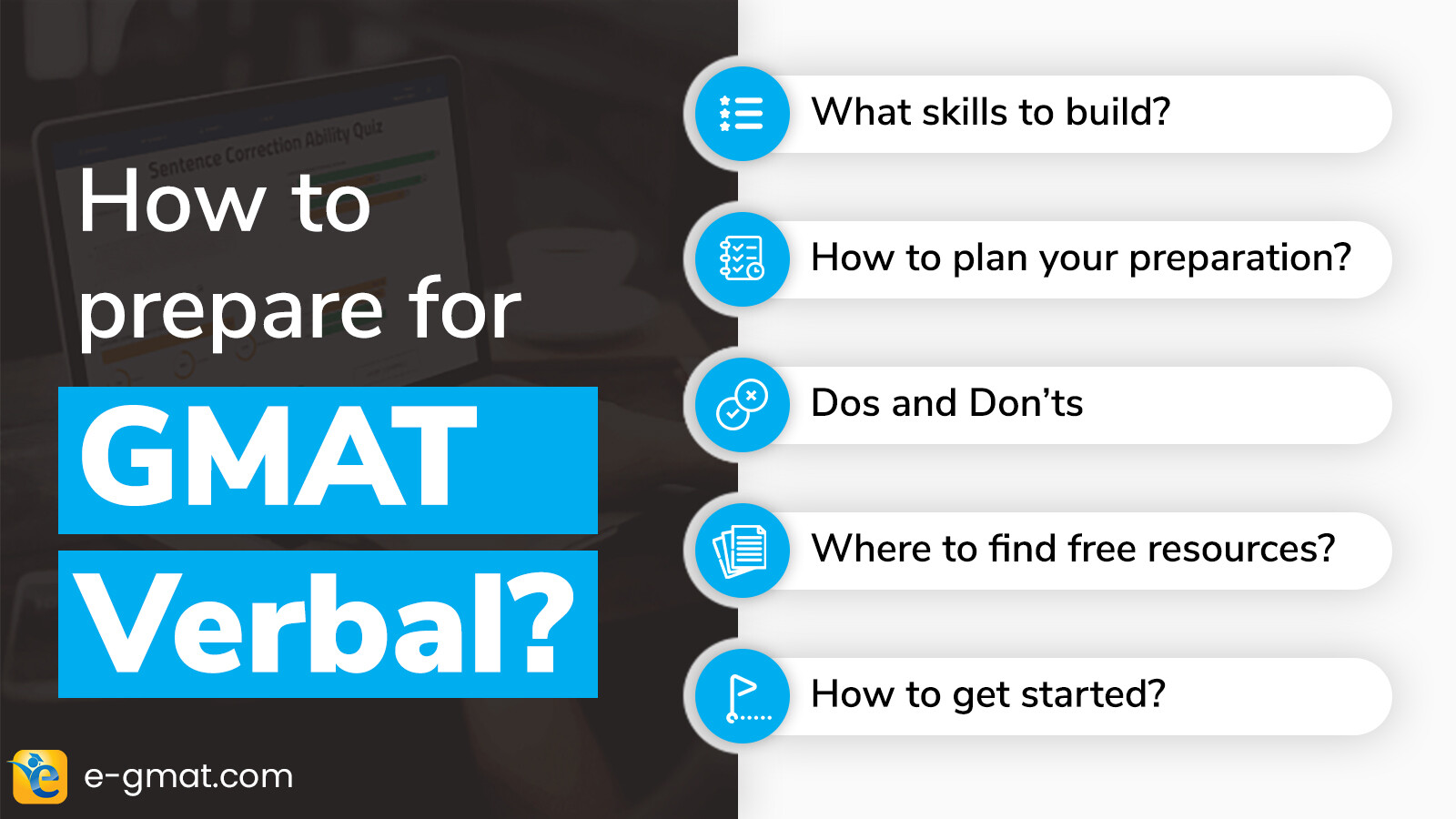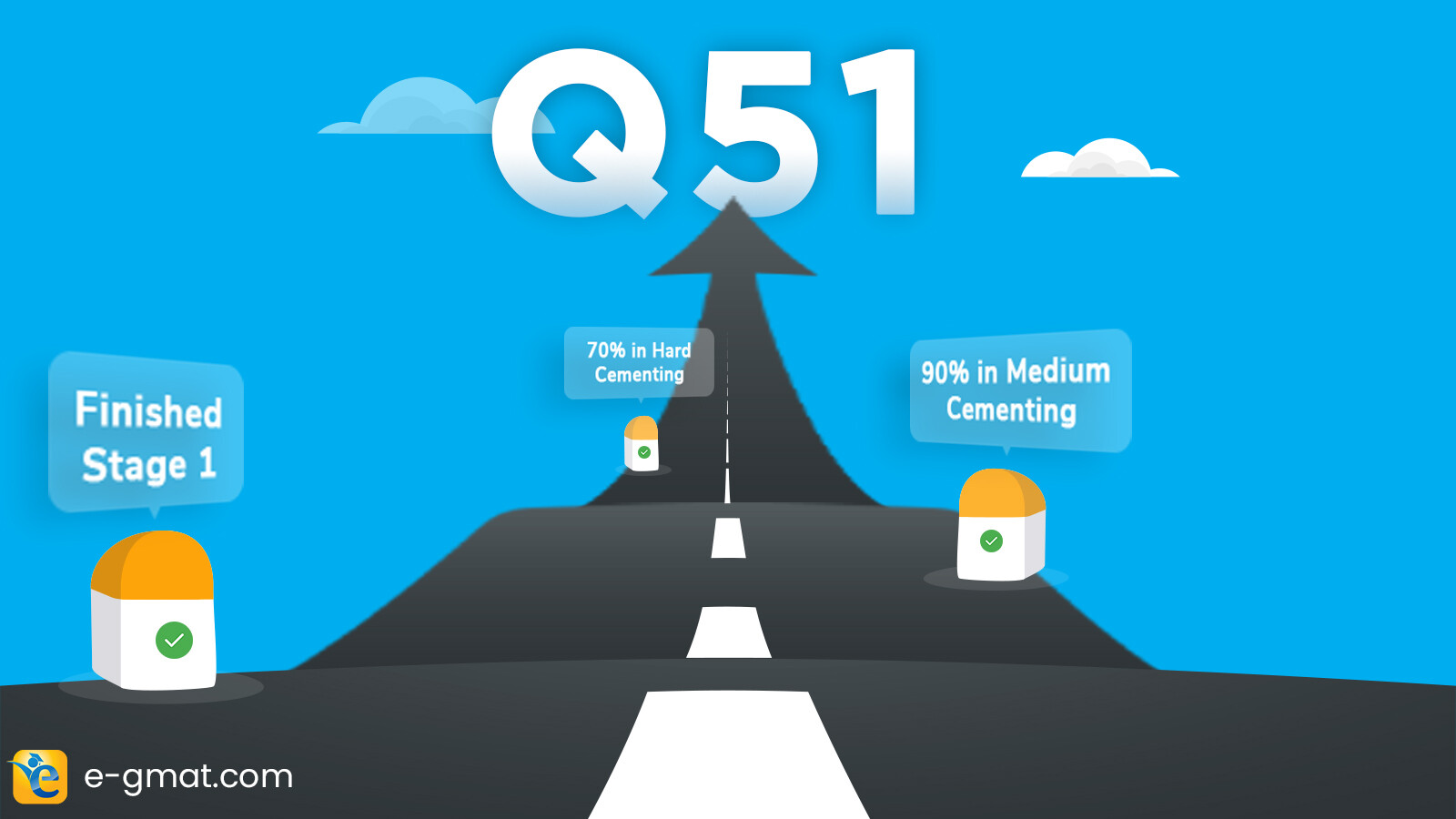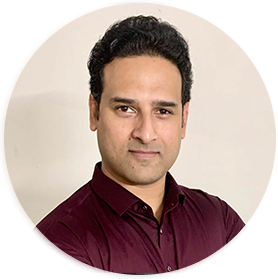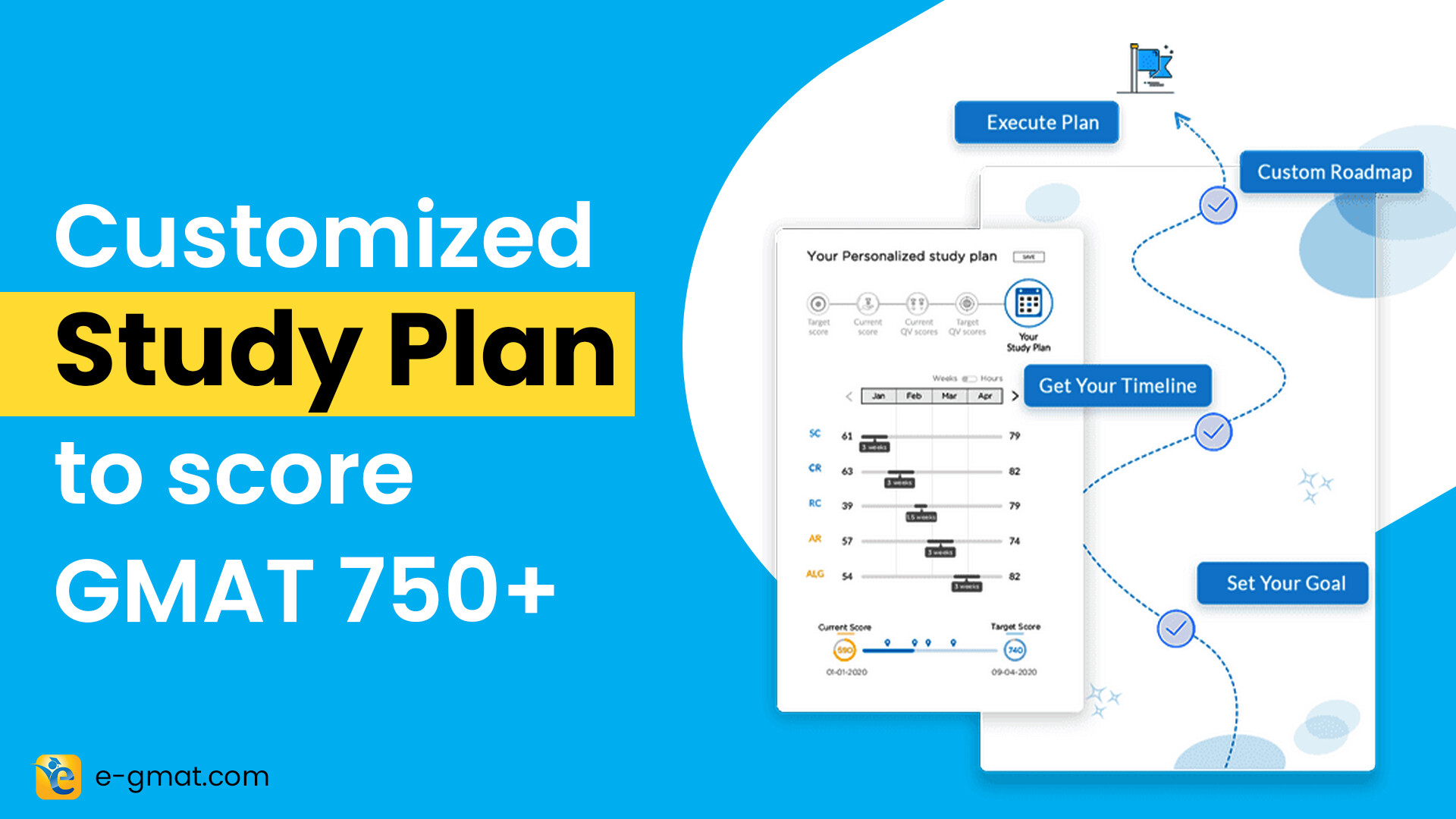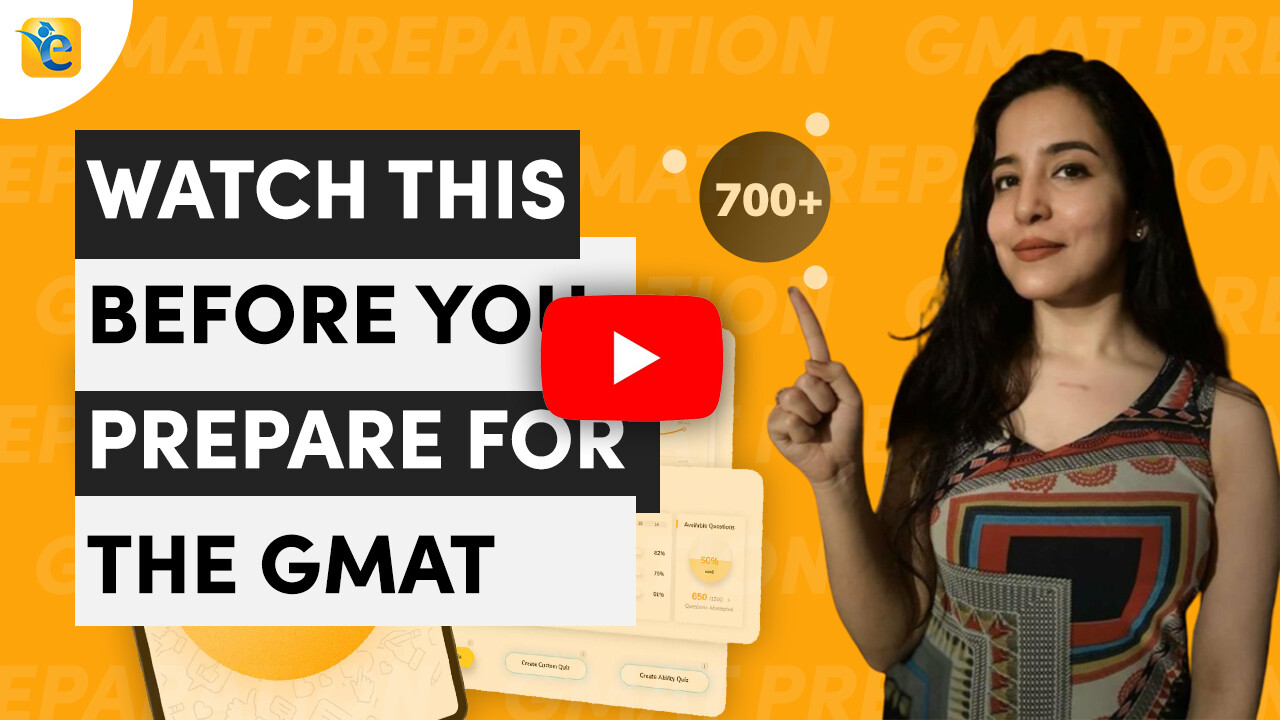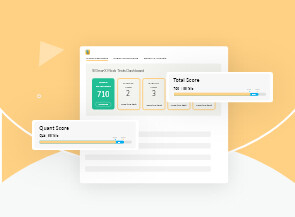A goal correctly set is halfway reached. Parv set his target to GMAT 720, which would help him get admission to his dream b-school, ISB.
He scored a 610 in his first mock, 110-point lower than his target, but he was confident that the e-GMAT course would help him ace the GMAT, just like it helped his brother and many of his collegemates.
He put his complete faith and commitment into the course and followed it diligently. He leveraged e-GMAT course content and methodologies to conquer his weaker areas in the verbal section. In fact, he was able to learn everything in SC, right from the basics to the advanced concepts in the comprehensive e-GMAT SC course. He quotes: “Till I started my GMAT preparation, I did not know what an Adverb was.”
Parv had been using some of the best practices underscored in the e-GMAT course, such as maintaining error logs and making notes in his other exams, before he even began his GMAT preparation.
While his diligence and hard work helped him significantly improve verbal, he completely ignored preparing for the GMAT quant section until he had only three days to practice and prepare. He reached out to e-GMAT strategy experts as he needed an intelligent plan to make the most of his time and cover up for what could have been fatal for him. Despite making the mistake of neglecting quant, Parv bagged a Q49 in the final GMAT exam.
Watch Parv a 3rd-year grad student, share his experience overcoming obstacles on his journey to hitting his target score of GMAT 720(Q49, V39) on the very first attempt.
Rajat: Congratulations on your 720(Q49, V39). How does it feel?
Parv: As soon as I left the room, I was jumping and quite happy. I believe I could have scored a little higher, but it feels good.
Rajat: Part of your happiness is also because you matched your brother’s score, 720?
Parv: Well, that’s always going to be there. We scored exactly the same marks in our board exams as well.
I was happy primarily because I attained the score I wanted for my ISB YLP application.
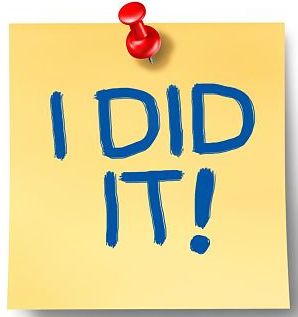
Rajat: Tell us a bit about what you do, and then what is it that you plan to do in the next two to three years before you start your MBA?
Parv: I am a third-year student at Shaheed Sukhdev College Of Business Studies. I took the exam to apply for ISB YLP. I’d get deferred admission. Before that, I’ll work for two years. I’d want to work in a Management Consulting role if I get an opportunity, before I start my MBA.
Why choose e-GMAT for GMAT preparation?
Rajat: Why did you choose e-GMAT? What challenges were you facing in your preparation for GMAT? How did you decide to go for the e-GMAT course?
Parv: I always knew that you need to be very consistent with GMAT, even if it’s just for 2-3 hours a day. I struggled to find that window which may not seem very difficult for a student, but I needed to get into the habit of doing it. That was the first challenge.
I subscribed to the verbal course, for which e-GMAT was popular. There was no such platform for quant specifically, nor was much attention paid to quant by most around me.
The thought of the e-GMAT came first because my brother had used the platform three years back and scored a 720. In my college, it was the norm to go with e-GMAT for anyone planning to prepare for the GMAT.
Rajat: What’s interesting is that they say challenging to break the brand. If you look at the stats in the last two years, since we launched our Quant 2.0, we’ve delivered 70% of the Q49+ scores reported on GMAT Club. But people still know e-GMAT just for verbal.
Initial preparations with e-GMAT platform
Rajat: How did you start the course?
Parv: I went through the introduction videos and learned how to operate the whole dashboard. Then straight away, I started by making notes for verbal. I went through the entire process without skipping anything. I went through the application files and all the quizzes as laid out. It worked well for me simply because I extensively practiced the concepts along with the course.
Rajat: When you went through the Sentence Correction course, what do you think stuck with you or made a difference in your thought process about SC?
Parv: First of all, grammar was not my strong point, and I feel it is not taught well in our schools in India. While studying for the GMAT through the course, I felt all that should have been taught in the school. It was a little daunting for me.
Honestly, I did not know what adverbs were before I went through the e-GMAT course. Some concepts deeply buried in my mind also came up as I progressed with the course. I had to focus and power through the ten days I prepared for the Sentence Correction course, but the rest of the course went seamlessly.
Parv’s Success Habits for Verbal Improvement
Parv: Many students say it’s challenging to learn grammar rules, but I used a technique from my school days to learn my physics formulas. I’d go through my notes every morning; the first day, it’d take me one and a half hours; the second day onwards, the time started to reduce by 15 minutes. I did the whole revision in 10 minutes on my final GMAT test day.
Rajat: I think this was a critical point. Successful people are successful not because of their intelligence; it’s because of their good habits. So don’t let go of those practices.
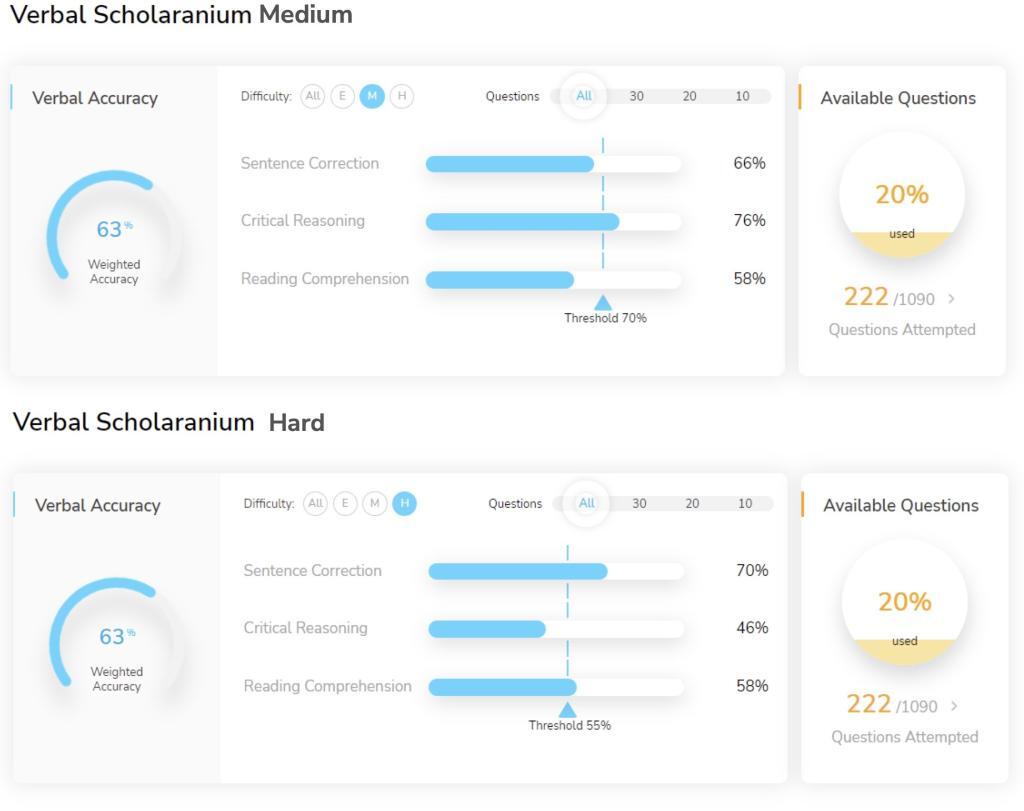
So, then you went from SC to CR, and how was the transition, or was it SC to RC?
Parv: I did CR first before RC. I wanted to finish the more difficult part first, which is why I started with SC.
I went through the CR course and learned the pre-thinking process, which came in handy during the exam. I did not find it very difficult. However, I was unsuccessful when I tried using them during the mocks. But while attempting CR questions during the final exam, I am not sure how, but I could easily pre-think before marking the correct options. It was surprising to me as well.
I went through the CR course and learned the pre-thinking process, which came in handy during the exam. I did not find it very difficult.
Rajat: Something clicked for you that day.
Preparation with Scholaranium
Besides the verbal course and learning methods, how did you use data from Scholaranium and mocks to enhance your preparation?
Parv: Error log was one of the major things I used to track what was going wrong. The template has many more details, and I had to cut down on some points to save time.
The second thing was mocks. The e-GMAT mocks are computer adaptive and different from others on the internet. It was also more difficult than Official Mocks. I was very invested in mocks and wanted to give as many as possible.
I used Scholaranium to test myself more than practice. I’d do a few OG questions, identify the weak area, and then do Scholaranium to see if I have corrected myself or not.
Read this article to learn more about Scholaranium: the most advanced quizzing platform and what all can you do with it.
Rushed quant preparation and exam day experience
Rajat: You also reached out to our support team. What did you write to them?
Parv: It was mostly about my struggle towards the end. As I mentioned earlier, I completely ignored quant in overconfidence. Towards the end, when I only had 2-3 days left, I got worried about the quant section. Because it was verbal and not quant, I still hoped I’d be able to cover up and do the damage control in time.
I gave quant first on the exam day and got stuck for six minutes on the first question. It was a word problem. It would have been easier if it was a more straightforward formula-based question but comprehending the language to solve the question felt challenging.
I was already nervous at the first question, and I got even more worried when I could not comprehend the words of that word problem. That took a lot of time. By the end, I had 11 minutes left to do the last 11 questions. At that moment, I felt I was not on the right path.
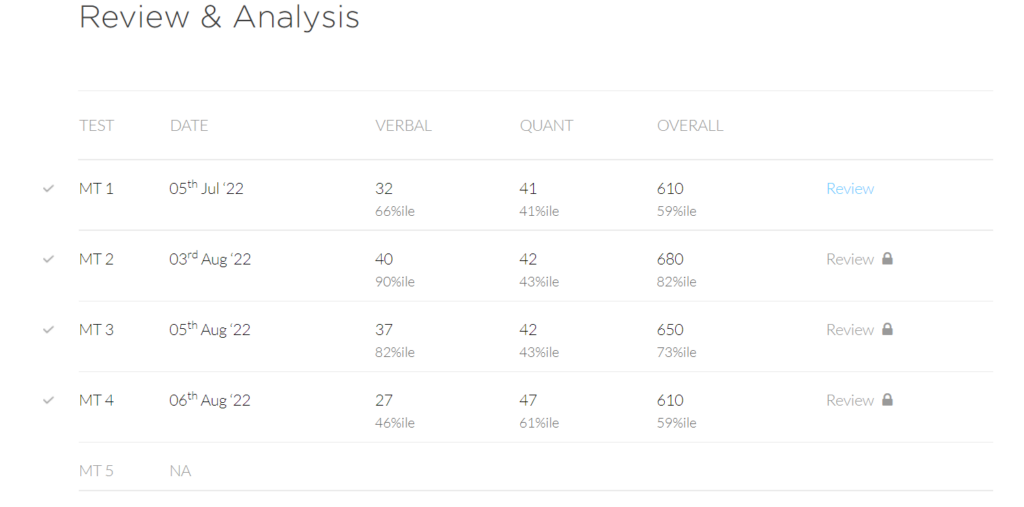
Rajat: If you miss a couple of words in a word problem question, it messes you up.
Parv: Since I was worried about my timing, I started doing verbal rather quickly. By the end, I still had 10 minutes to spare when I finished my verbal section. It was surprising, and I felt either I’ll score well or too bad.
Rajat: So, you overcompensated. What’s commendable here is that you did not do as well in the quant, but you did not give up as many people would in a similar situation. You applied your learnings immediately without losing focus which helped you to score 88the percentile.
I was apprehensive about my quant, even though it’s been my strong area, but for the GMAT preparation, I neglected it. I could have scored a Q50.
Three tips for GMAT aspirants
Rajat: If you were to advise your fellow GMAT aspirants on three best practices, what would that be?
Parv: The first one would be never to undervalue any section.
Work on your weaker areas. The adaptive test will exploit your weakness, and with one incorrect question, to the test will end up showing you easy or medium-level low-scoring questions. This will hamper your ability to score high overall.

The second is about Official Mocks. Many suggest that Official Mocks should be done at the end, but I don’t see it this way. It should be at the beginning or the middle to evaluate your ability and diagnose the gaps. It’s best to identify the problem areas earlier and correct them rather than waiting for the end.
If you score consistently in a section in 3-4 mocks, it establishes your ability apart from familiarizing yourself with the test environment and building stamina.
The third is to practice with hard-level questions. Initially, in quant, I was making a lot of silly mistakes. Once I identified the type of error, I’d do 3-4 quizzes specific to the type of error and add a condition not to make that type of mistake for those quizzes. I did that for all the types of errors I was making. It was an iterative improvement plan I followed to address my weak points.
I practiced extensively with difficult questions, which helped me cut down on my silly mistakes significantly.
Rajat: Difficult questions expose those mistakes better; once you know about them, it’s easier to fix them.
Another point I thought you’d include in your suggestion is to make notes because you made many of them and used them for revisions.
Parv: Honestly, I don’t consider notes as an optional thing. Over time, notes have helped me in all my essential and demanding exams. You tend to discover a technique to make notes tailored to your learning style.
Rajat: So, you are suggesting do not discard your success habits. It was really good talking to you. Thank you for sharing your success story.


